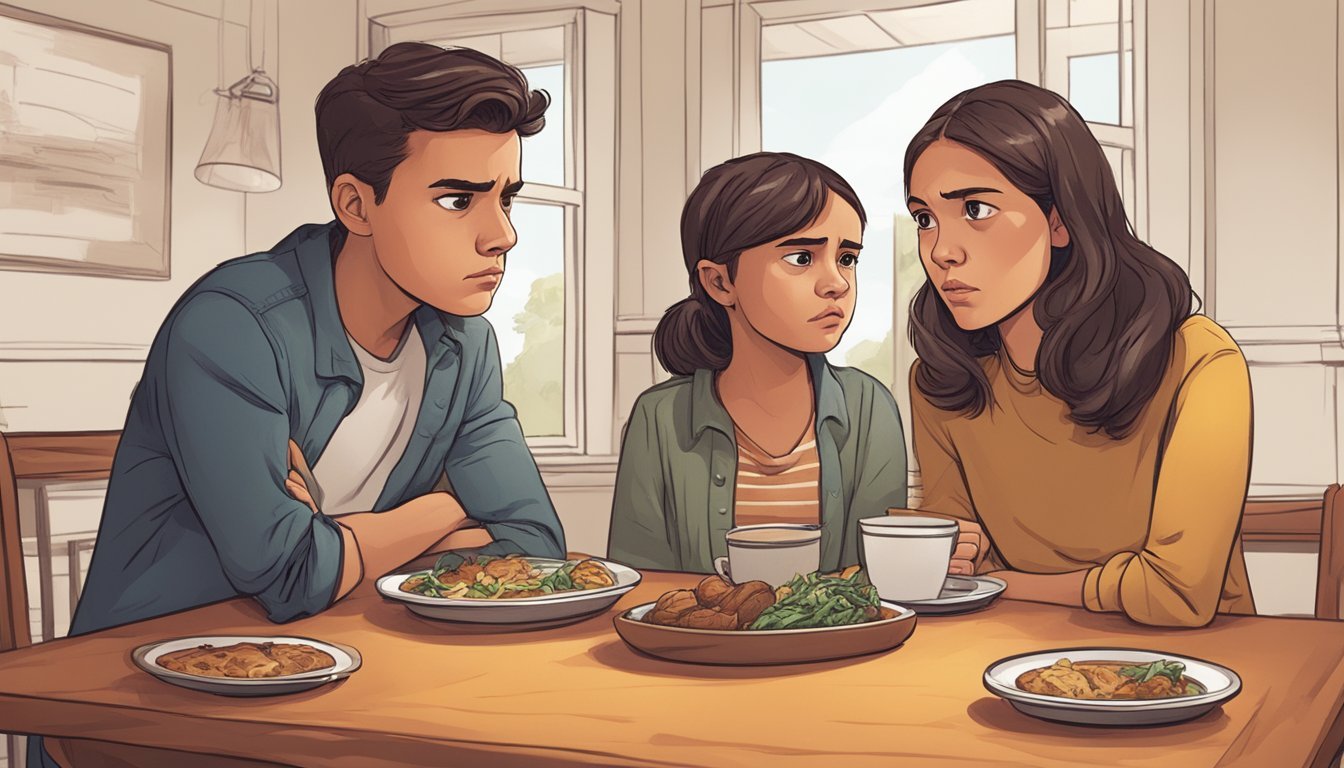Siblings Under Stress: Lessons from the Menendez Brothers' Dynamics
Analyzing Family Tragedy
The Menendez brothers case continues to captivate public interest decades after the shocking murders of their wealthy parents in Beverly Hills. Erik and Lyle Menendez, convicted of killing Jose and Kitty Menendez in 1989, exemplify the complex interplay of family dynamics and criminal behavior.
The brothers' story raises important questions about the impact of family stress, abuse, and privilege on psychological development and decision-making. Their trial, which became a media sensation in the early 1990s, brought issues of domestic violence and family secrets into the national spotlight.
Recent true crime productions have reignited discussions about the case, prompting some family members to call for the brothers' release. This renewed attention invites a closer examination of sibling relationships under extreme circumstances and the long-term consequences of childhood trauma within the criminal justice system.
The Menendez Family Background
The Menendez family's story is one of wealth, privilege, and complex relationships. Their Beverly Hills lifestyle and the contrasting personalities of Jose and Kitty Menendez shaped the environment in which Lyle and Erik were raised.
Upbringing in Beverly Hills
The Menendez brothers grew up in an affluent Beverly Hills mansion, surrounded by luxury and high expectations. Their father, Jose Menendez, had risen to become a successful entertainment executive, providing the family with a lavish lifestyle.
Lyle and Erik attended exclusive private schools and had access to numerous extracurricular activities. Tennis was a particular focus, with both boys excelling in the sport.
Despite their material comfort, the brothers faced intense pressure to succeed academically and professionally. Jose Menendez was known for his demanding nature and high standards for his sons.
Parental Figures: Kitty and Jose Menendez
Jose Menendez, a Cuban immigrant, built a successful career in the entertainment industry. He was ambitious, driven, and often described as controlling. Jose's focus on success and achievement significantly influenced the family dynamic.
Kitty Menendez, a former beauty queen, struggled with depression and substance abuse issues. She was often portrayed as emotionally unstable and distant from her children.
The contrast between Jose's domineering personality and Kitty's emotional volatility created a tense household atmosphere. This dynamic reportedly contributed to the brothers' psychological stress and feelings of isolation.
Jose and Kitty's relationship was said to be tumultuous, further complicating the family's interpersonal dynamics.
Chronology of the Menendez Brothers' Case
The Menendez brothers' case unfolded over several years, from the night of the murders to their eventual conviction. Key events include the killings, arrests, and multiple trials.
The Night of the Murders
On August 20, 1989, Jose and Kitty Menendez were shot to death in their Beverly Hills mansion. The couple was watching television when their sons, Lyle and Erik Menendez, entered the room and opened fire with shotguns.
The brothers initially claimed they were not home during the killings. They told police they had gone to see a movie and discovered their parents' bodies upon returning.
In the following months, Lyle and Erik spent lavishly on clothes, cars, and trips. This behavior later raised suspicions about their involvement in the murders.
The Arrest and Confession
Lyle Menendez was arrested in March 1990, with Erik turning himself in days later. Both were charged with first-degree murder.
The breakthrough in the case came when Erik confessed to his psychologist, Dr. Jerome Oziel. Erik's girlfriend overheard the confession and reported it to police.
Dr. Oziel's tapes of therapy sessions with the brothers became crucial evidence. A legal battle ensued over the admissibility of these tapes in court.
Trials and Verdicts
The first trial began in July 1993. The brothers were tried separately but simultaneously, with different juries. They claimed self-defense, alleging years of sexual and emotional abuse by their father.
This trial ended in hung juries for both brothers in January 1994. Prosecutors decided to retry the case.
The second trial started in August 1995. This time, the brothers were tried together with a single jury. In March 1996, Lyle and Erik were found guilty of first-degree murder.
Both brothers received life sentences without the possibility of parole. They were sent to separate prisons to serve their terms.
Family Dynamics and Mental Health Issues
Family relationships profoundly shape mental health and behavior. Abuse, dysfunction, and trauma within families can have severe psychological consequences, especially for children and siblings.
Parent-Child Relationship and Dysfunction
Unhealthy parent-child dynamics often underlie mental health issues. In the Menendez case, allegations of parental abuse emerged. Jose Menendez was described as controlling and demanding. Kitty Menendez reportedly struggled with depression and substance abuse.
Such dysfunctional parenting can lead to anxiety, depression, and aggression in children. It may also distort a child's understanding of healthy relationships.
Children raised in abusive environments frequently develop attachment issues and struggle to form secure bonds later in life.
Impact of Abuse on Sibling Bonds
Abuse can dramatically alter sibling relationships. Shared trauma may create an intense bond between siblings, as seen with Erik and Lyle Menendez.
Siblings may become protectors or confidants for each other in abusive homes. This can lead to enmeshed relationships and codependency.
Alternatively, abuse can foster rivalry or resentment between siblings competing for parental approval or safety.
Long-term effects often include difficulty trusting others and forming healthy relationships outside the family.
Psychological Profile of Erik and Lyle Menendez
Erik and Lyle Menendez exhibited signs of severe psychological distress. Both brothers reported experiencing anxiety, depression, and post-traumatic stress disorder.
Experts testified that the brothers displayed symptoms consistent with abuse victims, including:
Low self-esteem
Hypervigilance
Emotional dysregulation
Impaired social skills
Their defense argued that years of abuse led to a "learned helplessness" mentality. This psychological state may have contributed to their violent actions against their parents.
The brothers' close bond and mutual dependence were noted as unusual for their ages, possibly stemming from their shared traumatic experiences.
The Influence of Wealth and Privilege
The Menendez brothers' case highlighted how affluence and social status can shape perceptions and outcomes in high-profile criminal trials. Their privileged upbringing in Beverly Hills played a significant role in how the public and media viewed the case.
Perceptions of Entitlement
Lyle and Erik Menendez grew up in an environment of extreme wealth and luxury. Their father, Jose Menendez, was a successful entertainment executive who provided his family with a lavish lifestyle.
This upbringing fostered a sense of entitlement in the brothers. They were accustomed to getting what they wanted and living without financial constraints.
Critics argued that this mindset contributed to their actions and their behavior during the trial. The prosecution portrayed them as spoiled and greedy, willing to kill for their inheritance.
Media Portrayal and Public Image
The Menendez case became a media sensation, partly due to the family's wealth and social status. True crime author Dominick Dunne extensively covered the trials, bringing attention to the brothers' privileged background.
Television coverage of the proceedings shaped public opinion. The brothers' designer clothes and seemingly calm demeanor in court fueled debates about their character.
Ryan Murphy's "Monsters: The Lyle and Erik Menendez Story" further explored how wealth influenced the case's portrayal. The series examined how the media and public often conflated the brothers' privilege with guilt.
The intense focus on their affluent lifestyle sometimes overshadowed other aspects of the case, such as the allegations of abuse. This media narrative contributed to the complex public perception of the Menendez brothers.
Legal Outcomes and Long-Term Implications
The Menendez brothers' case had far-reaching consequences for the legal system and societal views on familial abuse. Their trial and sentencing sparked debates on justice, punishment, and the impact of childhood trauma.
Sentencing and Life in Prison
Lyle and Erik Menendez were convicted of first-degree murder in 1996. The judge sentenced them to life in prison without the possibility of parole. They serve their sentences in separate facilities to prevent collusion.
The brothers have adapted to prison life, participating in educational programs and maintaining contact with supporters. Lyle married in prison, while Erik focused on counseling fellow inmates.
Their case continues to draw public interest, with documentaries and books exploring their lives behind bars.
The Debate over Manslaughter Versus Murder
The Menendez trial ignited discussions about the appropriate charges for their crimes. Defense attorneys argued for manslaughter, citing the brothers' history of abuse as a mitigating factor.
Prosecutors pushed for first-degree murder, emphasizing the premeditated nature of the killings. The jury ultimately agreed with the prosecution's stance.
This debate highlighted the complexities of cases involving abuse claims and their impact on criminal intent. Legal experts continue to analyze the case as an example of the challenges in balancing justice and consideration of traumatic backgrounds.
Changes in Legal Precedents and Abuse Narratives
The Menendez case influenced how courts handle abuse claims in criminal trials. It brought attention to the long-term effects of childhood trauma on adult behavior.
Subsequent cases have seen increased acceptance of expert testimony on abuse and its psychological impact. This shift has led to more nuanced considerations of defendants' backgrounds in some trials.
The brothers' trial also sparked public discussions about familial sexual abuse, contributing to greater awareness and reporting of such crimes. Their case remains a reference point in legal and psychological studies of family dynamics and criminal behavior.
Aftermath: Where Are They Now?
The Menendez brothers' case continues to captivate public attention decades after their conviction. Their lives in prison and recent legal developments have sparked renewed interest in their story.
Erik and Lyle in the Contemporary Context
Erik and Lyle Menendez, now 53 and 56 years old respectively, have spent over 30 years in California prisons. In 2018, they were reunited at Richard J. Donovan Correctional Facility in San Diego after years of separation. The brothers have adapted to prison life, participating in various programs and maintaining contact with supporters.
Recently, their case has taken a new turn. The Los Angeles County District Attorney's Office recommended resentencing for the brothers in October 2024. This decision came after their attorneys presented new evidence related to alleged abuse by their father. A judge is expected to make a final ruling on their potential resentencing soon.
Public Interest and Ongoing Discussions
The Menendez case continues to generate significant public interest. True crime documentaries, books, and podcasts have revisited their story, often exploring the complexities of family dynamics and trauma. Social media platforms have seen a surge in discussions about the case, with younger generations discovering and debating its details.
Some view the brothers as victims of abuse, while others still see them as cold-blooded killers. This ongoing debate reflects broader societal discussions about justice, mental health, and the long-term effects of childhood trauma. The potential resentencing has reignited these conversations, prompting renewed examination of the case's nuances and the justice system's approach to such complex situations.





